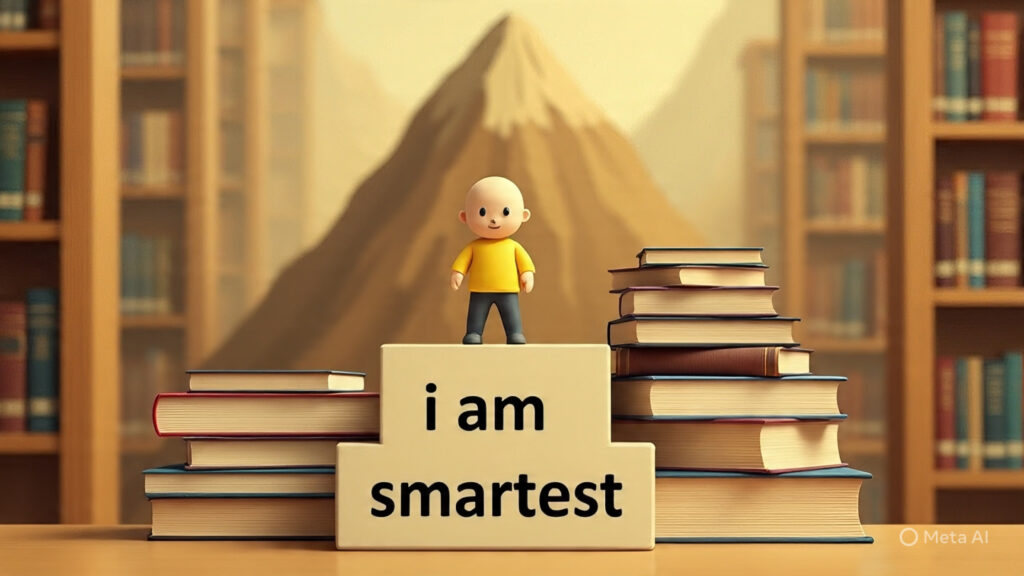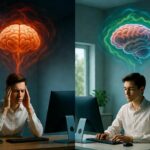Have you ever felt completely sure about something, only to realize you were totally wrong? This experience is more common than you think. Psychologists call it the Dunning-Kruger effect, a cognitive bias that makes people overestimate their knowledge or skills. It’s especially common among beginners in any field. Meanwhile, real experts often underestimate themselves, assuming their knowledge is obvious to everyone else. Understanding this effect helps us grow, learn faster, and evaluate our abilities more accurately. Let’s explore its origins, real-life examples, and practical ways to avoid falling into its trap.

The Unseen Blind Spot: A Paradox of Incompetence
The core irony of the Dunning-Kruger effect is simple: people who lack skill often don’t know they’re lacking it. If you don’t know what you don’t know, how can you recognize your own gaps? This blind spot makes improvement difficult and explains why overconfidence is so widespread. From new Zumba instructors who complete a short weekend course and start teaching full classes, to yoga trainers with minimal experience believing they are gurus, this bias is everywhere.
Beyond Overconfidence: The Broader Implications
The Dunning-Kruger effect goes beyond personal misjudgments—it affects society too. Confident but uninformed individuals can spread misinformation, skew decisions in workplaces, and even influence public opinion. Recognizing this bias helps us navigate conversations, evaluate expertise, and make better choices in both professional and social settings.

Understanding the Dunning-Kruger Effect: The Science Behind Overestimation
The Origins: Cornell Psychologists’ Landmark Study
In 1999, David Dunning and Justin Kruger at Cornell University conducted a study to explore this phenomenon. They discovered that students who performed poorly on tests of logic, grammar, and humor consistently overestimated their performance. In contrast, top performers often underestimated their abilities. This striking observation became the foundation of what we now call the Dunning-Kruger effect.
The Four Stages of Competence
Learning any new skill generally follows four stages, where the Dunning-Kruger effect mainly affects the first two:
- Unconscious Incompetence: You don’t know what you don’t know—this is where overconfidence thrives.
- Conscious Incompetence: You realize your knowledge gaps, which can feel humbling but essential for growth.
- Conscious Competence: You can perform the skill but must consciously focus on it.
- Unconscious Competence: The skill becomes second nature; you act intuitively and confidently.
A beginner yoga teacher, for instance, might feel confident after a short online course (Unconscious Incompetence), whereas a seasoned instructor understands the depth of practice required (Unconscious Competence).
The Role of Metacognition
Metacognition, or “thinking about thinking,” is crucial for countering the Dunning-Kruger effect. Without it, people can’t accurately judge their skills. Developing this ability allows for self-assessment, learning from mistakes, and recognizing when additional guidance or practice is needed.

Manifestations in Everyday Life
In the Workplace: Overconfident Colleagues and Underestimated Experts
The bias shows up clearly in work environments. A new colleague might confidently propose solutions without fully understanding the problem. Conversely, an experienced professional may hold back because they assume their knowledge is obvious. Both scenarios—overconfidence and undervaluing expertise—can slow team progress.
Politics and Public Opinion: The Amplification of Ignorance
The Dunning-Kruger effect also shapes public discourse. People often express opinions on complex issues like climate change or economics without sufficient knowledge, spreading misinformation unknowingly. Understanding this effect explains why some conversations feel so frustrating or misinformed.
Learning and Education: The Obstacle to Growth
Students who overestimate their understanding often skip important study or review, which can hurt grades. The first step toward genuine learning is acknowledging what you don’t know. This mindset encourages questions, deeper research, and practical skill development.

Why Highly Competent Individuals Underestimate Themselves
Interestingly, the Dunning-Kruger effect works in reverse too. Skilled individuals often underestimate their abilities because of cognitive biases like:
- The False Consensus Effect: Assuming others have the same knowledge.
- The Curse of Knowledge: Forgetting what it’s like to be a beginner.
These factors can make experts, including advanced Zumba or yoga instructors, doubt their skills while beginners feel overconfident.

Overcoming the Dunning-Kruger Effect
Cultivating Humility and a Growth Mindset
Recognize your limits. Accept that knowledge is vast and evolving. Adopt a growth mindset: believe that skills improve with effort and learning. This approach encourages continuous improvement and reduces overconfidence.
Seeking and Valuing Feedback
Honest feedback is invaluable. Ask mentors, peers, or supervisors to assess your work. Constructive criticism exposes blind spots and helps calibrate self-perception.
Embracing Continuous Learning and Practice
Take classes, read, and practice regularly. Continuous learning not only expands your skills but also provides benchmarks to evaluate your competence realistically. For example, attending advanced yoga workshops can reveal the depth of practice you hadn’t realized in basic courses.
Developing Metacognitive Skills
Reflect on your thought processes and learning methods. Keeping a journal or reviewing your performance against expected outcomes can highlight gaps. Over time, this practice minimizes the effects of the Dunning-Kruger effect.
Conclusion: The Path to Realistic Self-Awareness
The Dunning-Kruger effect teaches us that our self-perception is often flawed. Beginners may overestimate their abilities, while experts might undervalue theirs. Recognizing this bias, cultivating humility, seeking feedback, and committing to lifelong learning are the keys to accurate self-assessment. Whether in fitness, education, or professional life, understanding this phenomenon helps us grow, make smarter decisions, and share our knowledge wisely.







